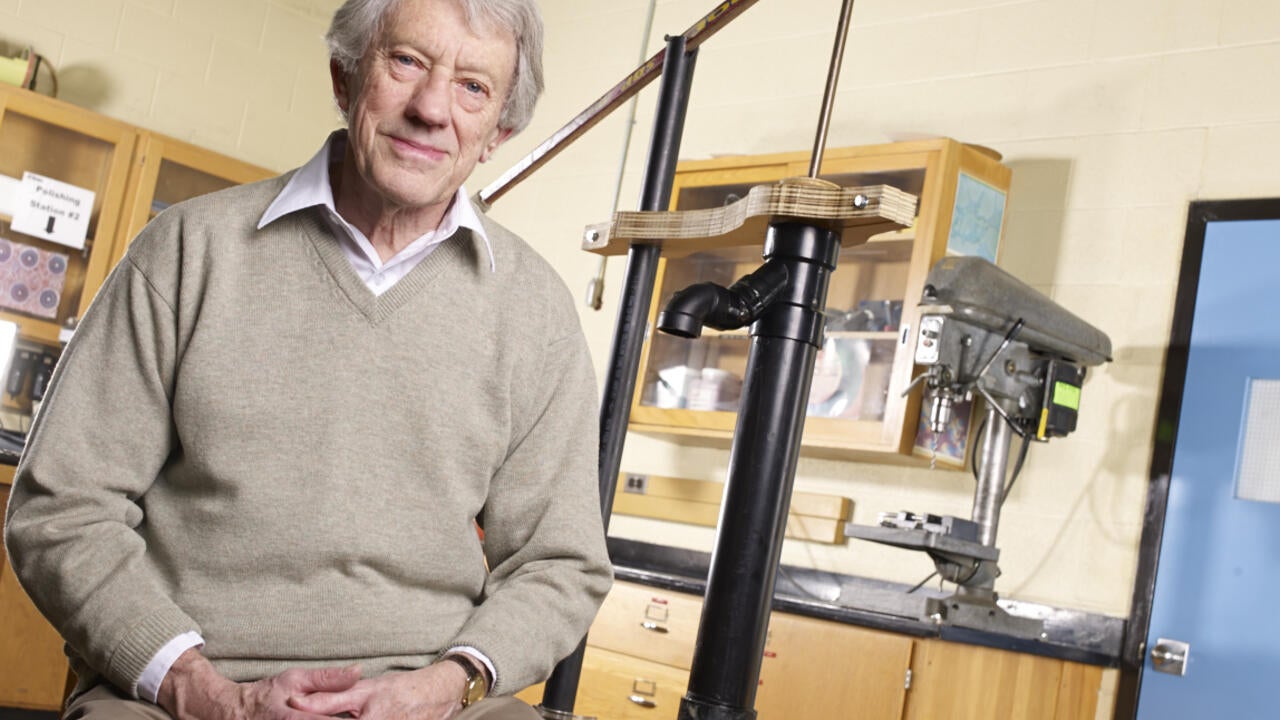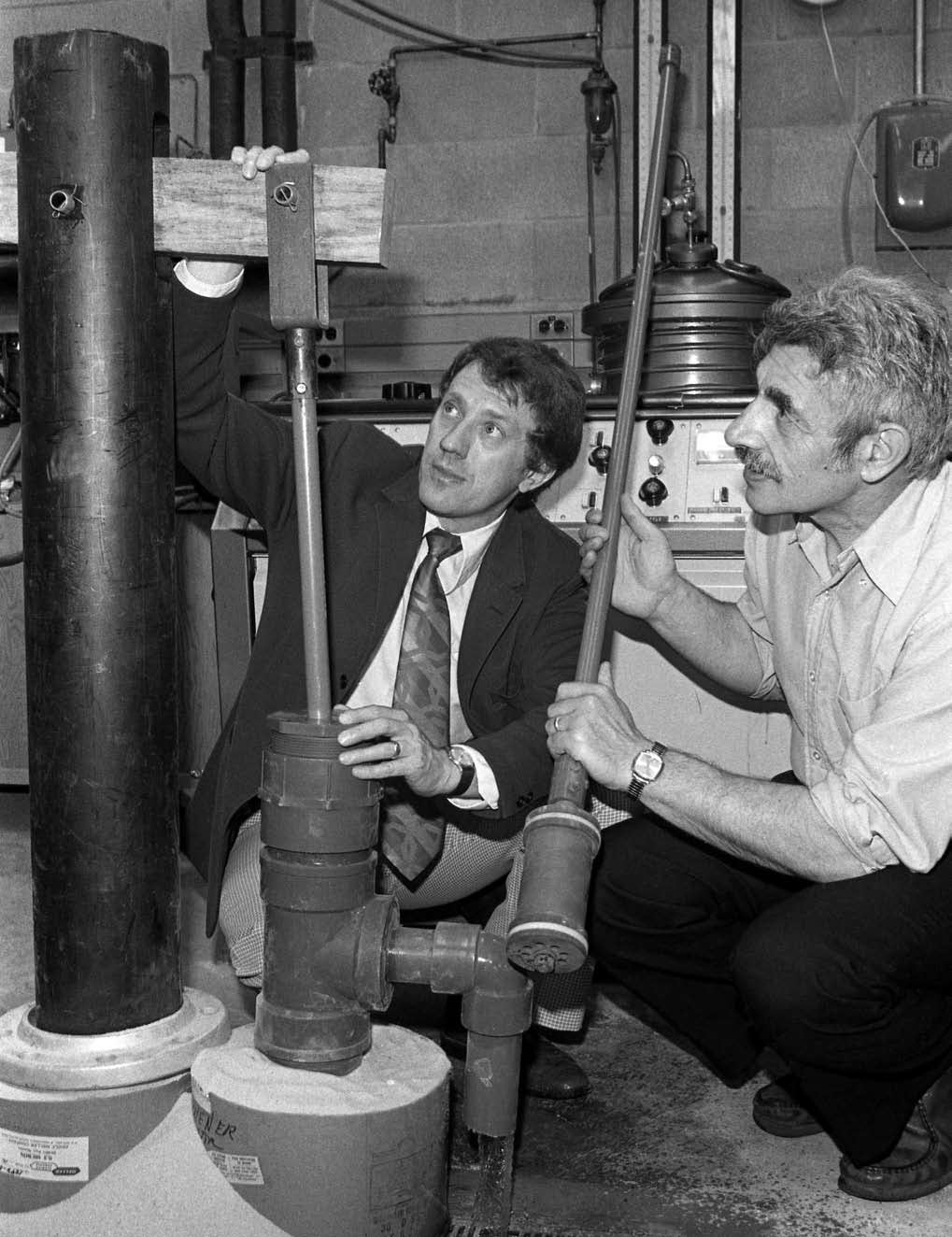
Co-Inventor of the Waterloo Pump remembered
Alan Plumtree gained international attention as a developer of an ingenious invention that delivers clean, safe water to developing countries

Alan Plumtree gained international attention as a developer of an ingenious invention that delivers clean, safe water to developing countries
By Carol Truemner Faculty of EngineeringAlan Plumtree, who helped put the University of Waterloo on the map as an inventor of a pump that provides clean drinking water to developing countries, died suddenly on November 5.
Plumtree, a Waterloo mechanical engineering professor, and Alfred Rudin, a Waterloo chemistry professor, created the hand-operated pump in the late 1970s after being approached by the International Development Research Centre.
Taking inspiration from their Mennonite neighbours, Plumtree and Rudin made a pump that was both simple and versatile with local materials that  could be easily manufactured and repaired by villagers using readily available materials.
could be easily manufactured and repaired by villagers using readily available materials.
“Water pumps at that time were manufactured in industrialized countries and exported to developing nations,” recalled Plumtree in a 2015 interview. “The imported pumps were complex machinery, although very lovely and worked fine when new, when they broke down, they were done.”
Alan Plumtree, left, and Alfred Rudin created the Waterloo Pump in the 1970s.
The Waterloo Pump design is still in use in countries around the world, delivering clean, safe water on demand. In 1995, it was the subject of a Canada Heritage Minute.
Born in Lincolnshire, England in 1936, Plumtree received a BSc and doctorate in metallurgy at the University of Nottingham in the 1960s.
After completing his PhD, Plumtree and his wife Diana emigrated to Canada where he became an assistant professor in materials and metallurgical engineering at the University of Toronto.
In 1965, he joined the mechanical engineering department at the University of Waterloo where he taught thousands of students before retiring in 2004. He served in many capacities at the University including as associate dean for graduate studies, and a member of the Board of Governors.
Mary Wells, the University’s new dean of engineering, says Plumtree was responsible for her joining Waterloo Engineering in 2007.
She was working as a materials engineering professor at the University of British Columbia when Plumtree contacted her about a position in Waterloo’s mechanical and mechatronics engineering department.
“He was an incredibly kind and supportive person who encouraged me to apply to Waterloo Engineering,” Wells says. “After I was hired, he generously became a mentor to me when I took over teaching some of the courses he had taught. I will miss him very much.”
Plumtree’s research focus was the relationship between the mechanical properties of materials and their microstructure composition and heat treatment. He was the author of more than 200 scientific and technical publications.
His achievements were recognized with a Doctor of Science degree from the University of Nottingham and the title of Distinguished Professor Emeritus of mechanical and mechatronics engineering by the University of Waterloo.
The Alan Plumtree graduate scholarship in mechanical and mechatronics engineering was established by Waterloo’s mechanical and mechatronics engineering department with a donation from Plumtree.
According to his obituary, Plumtree and his wife enjoyed travelling throughout the world during their 61-year marriage.
“Alan was a keen follower of Premier League soccer but on summer weekends the countryside beckoned and day trips around Ontario with a picnic lunch at hand were simple pleasures he enjoyed,” his obituary says.

Read more
Here are the people and events behind some of this year’s most compelling Waterloo stories

Read more
Meet five exceptional Waterloo graduate students crossing the convocation stage as Class of 2025 valedictorians

Read more
Waterloo Engineering alum wears her iron ring proudly while building her career in quantum tech in Germany
The University of Waterloo acknowledges that much of our work takes place on the traditional territory of the Neutral, Anishinaabeg, and Haudenosaunee peoples. Our main campus is situated on the Haldimand Tract, the land granted to the Six Nations that includes six miles on each side of the Grand River. Our active work toward reconciliation takes place across our campuses through research, learning, teaching, and community building, and is co-ordinated within the Office of Indigenous Relations.